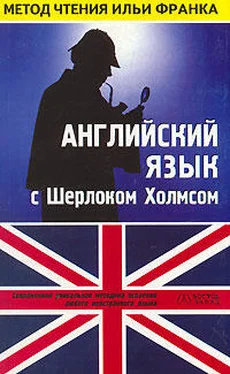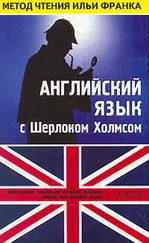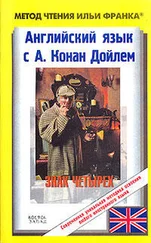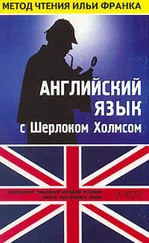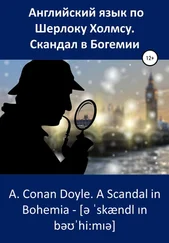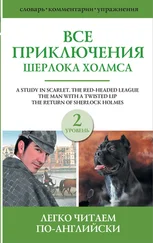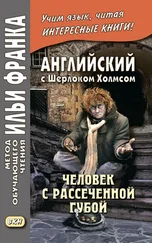“In short, that she had become suddenly deranged (короче говоря, она внезапно потеряла рассудок: «стала неуравновешенной»; deranged — приведенный в беспорядок; психически неуравновешенный, ненормальный; душевнобольной; to range — приводить в порядок; выстраивать в ряд) ?”
“Well, really, when I consider that she has turned her back (ну да; когда я думаю, что она отказалась; to turn one's back upon: «повернуться спиной» — отвернуться, отказаться от /кого-либо или от чего-либо/; покинуть, бросить /кого-либо или что-либо/) — I will not say upon me (нет, не от меня) , but upon so much that many have aspired to without success (а от всего того, к чему многие /женщины/ стремились безуспешно) — I can hardly explain it in any other fashion (мне трудно объяснить это как-то иначе) .”
jealousy ['dZel@sI], propound [pr@'paund], consciousness ['kOnS@snIs]
“Still, jealousy is a strange transformer of characters. Pray what is your own theory as to what took place?”
“Well, really, I came to seek a theory, not to propound one. I have given you all the facts. Since you ask me, however, I may say that it has occurred to me as possible that the excitement of this affair, the consciousness that she had made so immense a social stride, had the effect of causing some little nervous disturbance in my wife.”
“In short, that she had become suddenly deranged?”
“Well, really, when I consider that she has turned her back — I will not say upon me, but upon so much that many have aspired to without success — I can hardly explain it in any other fashion.”
“Well, certainly that is also a conceivable hypothesis (что ж, конечно, это тоже возможное предположение) ,” said Holmes, smiling (сказал Холмс, улыбаясь) . “And now, Lord St. Simon, I think that I have nearly all my data (а теперь, лорд Сент-Саймон, у меня, пожалуй, есть почти все /необходимые/ сведения) . May I ask whether you were seated at the breakfast-table (можно спросить: сидели ли вы за свадебным столом таким образом) so that you could see out of the window (что могли видеть, что происходит на улице: «могли смотреть в окно») ?”
“We could see the other side of the road and the Park (мы видели другую сторону дороги = противоположный тротуар и Парк) .”
“Quite so (отлично; quite so — несомненно, правильно, совершенно верно) . Then I do not think that I need to detain you longer (итак, больше нет необходимости задерживать вас) . I shall communicate with you (я свяжусь с вами; to communicate — сообщать; поддерживать связь, общаться) .”
“Should you be fortunate enough to solve this problem (только бы вам посчастливилось разрешить эту загадку) ,” said our client, rising (сказал наш клиент, вставая) .
“I have solved it (я уже разрешил ее) .”
“Eh? What was that (что? что вы сказали) ?”
“I say that I have solved it (я сказал, что разрешил ее) .”
hypothesis [haI'pOT@sIs], communicate [k@'mju:nIkeIt], enough [I'nVf]
“Well, certainly that is also a conceivable hypothesis,” said Holmes, smiling. “And now, Lord St. Simon, I think that I have nearly all my data. May I ask whether you were seated at the breakfast-table so that you could see out of the window?”
“We could see the other side of the road and the Park.”
“Quite so. Then I do not think that I need to detain you longer. I shall communicate with you.”
“Should you be fortunate enough to solve this problem,” said our client, rising.
“I have solved it.”
“Eh? What was that?”
“I say that I have solved it.”
“Where, then, is my wife (тогда где же моя жена) ?”
“That is a detail which I shall speedily supply (эту деталь я скоро сообщу вам; to supply — давать, поставлять; удовлетворять /нужды, желания/) .”
Lord St. Simon shook his head (лорд Сент-Саймон покачал головой) .
“I am afraid that it will take wiser heads than yours or mine (боюсь, что для этого потребуются более мудрые головы, чем у нас с вами) ,” he remarked, and bowing in a stately, old-fashioned manner he departed (заметил он, и, величественно и чинно поклонившись, удалился; old-fashioned — старомодный, устаревший; старомодный, придерживающийся старых идеалов, обычаев; stately — величавый, величественный, горделивый, полный достоинства) .
“It is very good of Lord St. Simon to honor my head (со стороны лорда Сент-Саймона было очень любезно оказать честь моей голове) by putting it on a level with his own (поставив ее на один уровень со своей) ,” said Sherlock Holmes, laughing (сказал Шерлок Холмс, смеясь) . “I think that I shall have a whisky and soda and a cigar (я, пожалуй, выпью виски с содовой и выкурю сигару) after all this cross-questioning (после подобного: «всего этого» перекрестного допроса) . I had formed my conclusions as to the case (я пришел к кое-каким заключениям по данному делу) before our client came into the room (до того, как наш клиент вошел в комнату) .”
“My dear Holmes (дорогой Холмс) !”
departed [dI'pA:tId], honor ['On@], laughing ['lA:fIN]
“Where, then, is my wife?”
“That is a detail which I shall speedily supply.”
Lord St. Simon shook his head.
“I am afraid that it will take wiser heads than yours or mine,” he remarked, and bowing in a stately, old-fashioned manner he departed.
“It is very good of Lord St. Simon to honor my head by putting it on a level with his own,” said Sherlock Holmes, laughing. “I think that I shall have a whisky and soda and a cigar after all this cross-questioning. I had formed my conclusions as to the case before our client came into the room.”
“My dear Holmes!”
“I have notes of several similar cases (у меня есть записи о нескольких подобных делах) , though none, as I remarked before, which were quite as prompt (хотя ни одно из них, как я уже замечал ранее, не было столь быстрым) . My whole examination served to turn my conjecture into a certainty (расспросы помогли превратить предположение в уверенность; examination — осмотр, изучение; допрос; to serve to — служить; помогать, способствовать) . Circumstantial evidence is occasionally very convincing (косвенные доказательства порой бывают очень убедительны; circumstantial evidence — косвенные доказательства, косвенные улики; circumstance — обстоятельство; circumstantial — зависящий от обстоятельств; побочный, косвенный) , as when you find a trout in the milk, to quote Thoreau’s example (как когда находишь форель в молоке, цитируя Торо /т. е. для Холмса все очевидно. В XIX в. в Новой Англии бастовали работники на молочных фермах; молоко часто разбавлялось водой. Форель живет в чистой воде/; Thoreau, Henry David /1817-1862/ — Торо, Генри Дэвид, американский писатель и философ; прожив два года в лесу, написал книгу «Уолден, или Жизнь в лесу» /1854/ — романтическую робинзонаду о жизни человека в мире природы как возможности спасения личности от современной цивилизации; to quote — цитировать; ссылаться на) .”
Читать дальше
